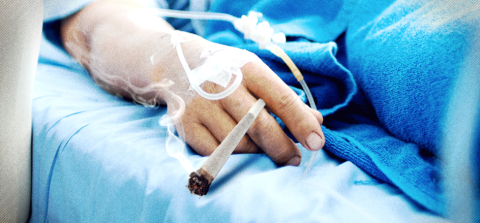
We’ve all been there. Maybe you’ve never smoked weed before, or maybe you are coming off of a big tolerance break. You take a massive rip out of the bong and, suddenly, you’re having a heart attack. What’s happening? Who am I? How did I get so high? I must be dying…
But you aren’t. You’re just baked off your ass and need to chill out on the couch with some Planet Earth for a few hours, eat some pizza and drink a glass of water. You’ll be just fine.
However, for many people, that “too high” sensation is enough to warrant an emergency room (ER) visit. Thousands of Coloradans are checking themselves into ER’s annually because they’re just too high and can’t hang.
In fact, between 2012 and 2016, researchers from the University of Colorado Hospital identified 9,973 ER visits that were all related to marijuana use — more than a threefold increase from previous years. Some of these patients came in because they ate too much edibles. Most came in because they smoked too much flower or concentrate.
Regardless of what form of cannabis they went to the hospital for having consumed, weed-related ER visits spiked significantly since prohibition ended in this state. Which, not surprisingly, is offering all kinds of fodder for anti-cannabis groups, who point to this number in horror, shrieking of toxic peril and reefer madness.
“Look what you’re doing to this state!”
“How can you say this drug is ‘safe?’”
“Reefer kills!”
But, I have news for those narcs: it’s not the drug’s fault. It’s not even really the person’s fault for having consumed too much cannabis too quickly. If we’re going to blame anyone, we should be pointing fingers at The State for not offering enough education and freedom of use. Cannabis, for all the love it’s been getting in recent years, is still very much a stigmatized substance in America — research is limited by its federally illegal status, education is restricted to the Underground by its cultural stigma and use is still legally prohibited in public. If you want to learn about cannabis you have to do your own research, finding your own sources of information; if you want to smoke it you have to do so obscured in privacy.
And people are surprised weed-related ER visits are up?
Just imagine if, in 2014, instead of cannabis prohibition, Colorado had lifted a prohibition of alcohol, without any guidance on how to use it, without providing any information on how much is healthy or acceptable to drink, or what repercussions there are for drinking too much. Imagine the spike in ER visits the state would see then. Imagine the death toll.
Whenever a drug is decriminalized and then legalized there’s going to be an adjustment period. That doesn’t make the drug itself evil, it just means that there needs to be more done to educate people on how and who should use it.
When it comes to alcohol there are places for this: bars specified for consumption where people can familiarize themselves with the social norms of drinking. They allow people the opportunity to observe all the different stages of drunkenness, to see how it affects others and to experiment with different types of booze and with different dosages themselves.
For cannabis, no such places exist.
“If we had social use lounges we could teach people how to consume cannabis and help prevent them from going to the hospital,” says Larissa Bolivar, executive director of the Cannabis Consumption Coalition. “Instead, cannabis consumers, especially new ones or those new to edibles or concentrates, are on their own and clearly that is not working out well.”
Luckily, this may soon be changing. A bill that would allow for social cannabis consumption in dispensaries, hotels, cafes, arcades, music venues and other businesses passed out of a House committee on a 7-4 vote on March 28th. If passed into law, businesses would be able to apply for cannabis consumption licenses, just like they’re allowed to apply for liquor licenses.
This bill would change the way people consume cannabis in this state — it would no longer be something that has to be hidden, something that must be done in the shadows. It would become something normalized; something that people could talk about with their doctors, that parents could talk about with their kids; something that could be enjoyed instead of demonized.
“We need to protect cannabis consumers, not alienate them,” Bolivar says.
By treating this legal substance like an illegal one, the State is creating an environment ripe for misuse. It's no wonder that weed-related emergency room vists spiked after prohibition ended, but that doesn't have to be a trend that Colorado maintains.
- Log in to post comments